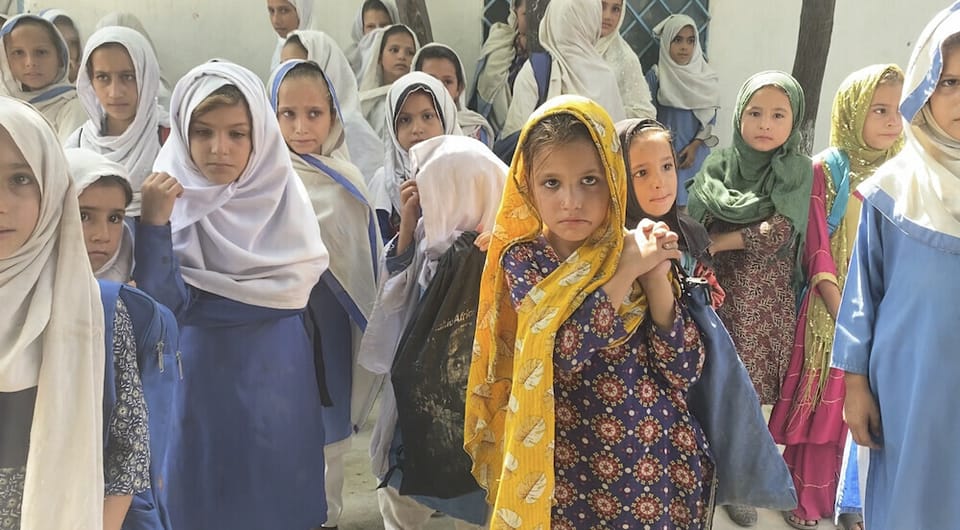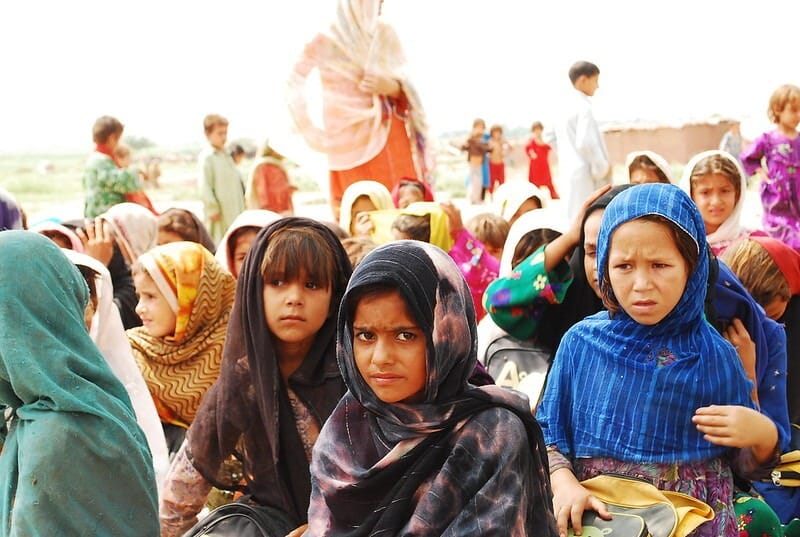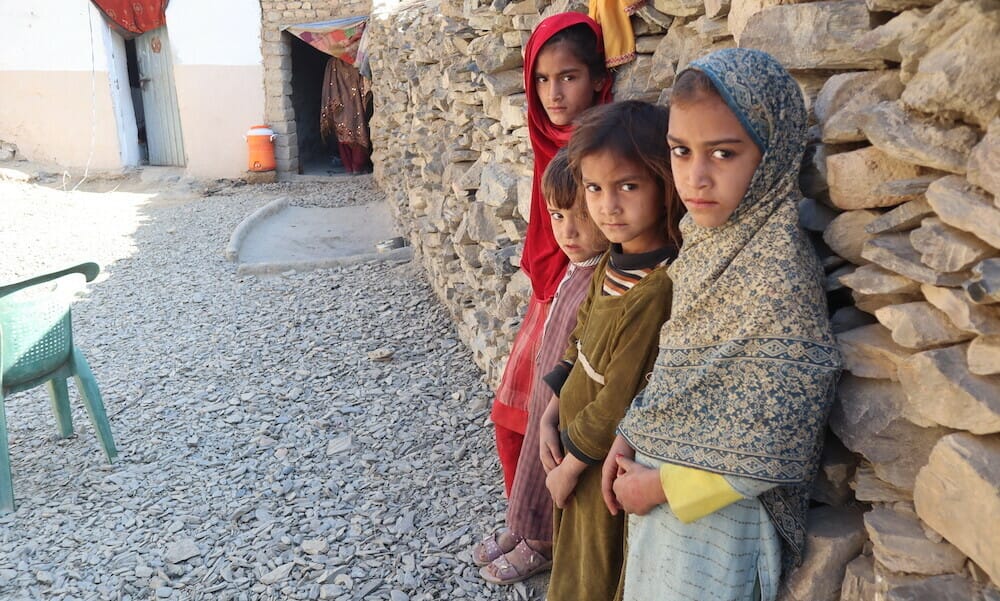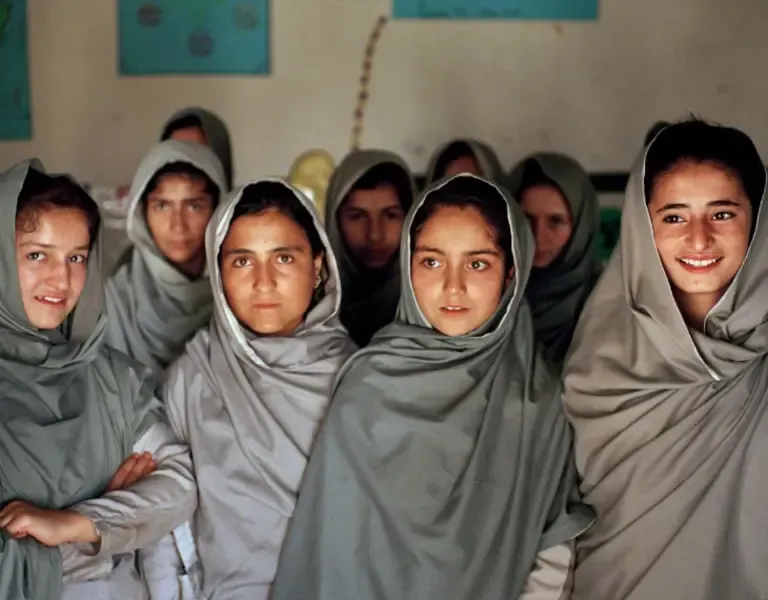No place like 'home', or no 'home': Afghan Women Caught Between Deportation and Denial

Names have been changed to protect the privacy of victims*
“I don’t have any hopes left. If I go back to the country they say is mine, it will be over for me,” says Sitara*, 14, as she picks at the corner of her dupatta. I look at her, thinking of all the times I have taken the privilege of chasing my dreams for granted.
In October 2023, Pakistan announced that it would begin deporting all foreign nationals without valid visas, or those who had overstayed by more than a year. The decision hit Afghans the hardest, since they made up nearly 98 percent of foreign nationals in the country. At the time, the UN estimated that 3.8 million Afghans were in Pakistan, while Pakistani officials put the figure closer to 4.4 million. By January 2025, more than 813,000 Afghans had already been forced to return.
The government framed the deportations as a response to rising insecurity, pointing to suicide bombings and militant attacks carried out by Afghan refugees residing within the country. Officials claimed that 14 out of 24 suicide bombings in 2023 were linked to Afghan nationals, and that groups like the TTP and Baloch insurgents were finding safe haven across the border. But critics saw other motives. Many believed the campaign was less about security and more about political leverage, Islamabad’s way of pressuring the Taliban to cooperate, while also scapegoating Afghans for Pakistan’s economic crisis.
Afghan migration to Pakistan is not new. Millions first crossed the border after the Soviet invasion of 1979, followed by later waves during the U.S. invasion in 2001 and again in 2021 when the Taliban returned to power. Many of those now facing deportation were born in Pakistan and have never set foot in Afghanistan. By government estimates, around 1.7 million Afghans in the country were undocumented.

The campaign unfolded quickly. On October 3, 2023, Pakistan’s caretaker government gave all “illegal” residents until the end of the month to leave voluntarily. Between 100,000 and 165,000 Afghans did so. On November 1, authorities began enforcing deportations, setting up nearly 50 holding centers across the country, from Punjab and Sindh to Balochistan, Khyber Pakhtunkhwa, Gilgit and Islamabad, to process and detain people before pushing them across the border.
Officials insisted that migrants would be treated “with respect,” but reports soon surfaced of police harassment, asset seizures worth billions of dollars, and even registered refugees being targeted.
Pakistan also introduced a “One Document Regime,” requiring every Afghan to carry a valid visa, with the policy first enforced at the busy Torkham crossing.
By early November 2023, border authorities reported that more than 174,000 Afghans had already crossed back into Afghanistan. For many, the return meant entering a country they no longer knew, or had never known at all. Sitara, and other characters of this story are among them.
No place to call ‘home’
Sitara has never known any place other than Afghan Basti in Karachi, where she was born and raised. At the mention of Afghanistan, she cannot find even a single ray of familiarity. She tries hard to mask it, but as I look at her over a video call arranged by someone else, I can tell she feels lost and uncertain about what she is being forced into.
“I have never seen that country, but I know how they treat women there. They are not allowed to study, not allowed to go out, not allowed to move freely, and that is not how I imagined my life. I wanted to study, something so basic, but it feels like I can’t do that anymore. I am trying to make my peace with it,” she tells me.

Her fears are not misplaced. Every new decree by the Taliban, every restriction on women’s movement, work, or education, only deepens the anxiety of girls like Sitara who see their futures shrinking before they even begin.
Since taking power in August 2021, the Taliban have stripped women of basic rights — banning girls from high school, driving most women out of public life, restricting their movement, employment, and education. These restrictions aren't theoretical. They’ve shown themselves to be life and death in Afghanistan’s recent disasters.
On September 1, 2025, a magnitude-6 earthquake struck parts of eastern Afghanistan. More than 2,200 people died and 3,600 or more were injured, thousands left homeless.
In the struggle to rescue and treat survivors, women suffered disproportionately. Aid agencies reported that nearly 90 percent of medical staff in affected areas were male, with very few female doctors available. Many wounded women refused to be treated by men, but female medical professionals were scarce because of earlier bans on advanced education for women.
Cultural and official rules added further barriers. For example, male rescuers often could not touch injured women because of Taliban or local “no-skin-contact-with-unrelated-males” rules. In several villages, women and girls were literally left under rubble or waiting in pain as male rescuers focused on dragging out men and children first. In remote areas, women could not even leave their tents without a male guardian and therefore could not reach clinics.
WHO and other humanitarian bodies have pleaded with the Taliban to suspend these restrictions in emergencies, to allow female aid workers to move without a male guardian, to increase female medical staff, and to let women get care when male staff are their only option. But these demands have so far been met with inconsistent responses.
Just like Sitara, Sheena*, 23, a mother of two, carries the same fears. Holding her six-month-old daughter, she tells me that while her own life has been spent merely surviving, she does not want her daughter to go through the same.
“I have spent my entire life in Pakistan, I have an idea of how things work here, if my children fall sick, I have the liberty to take them to doctors, however, when I move from here, not only do I have to start from scratch, but I also have to navigate my way through the restrictions,” she said.
Navigation of basics
For women like Sheena and Sitara, when they imagine a future in the country the world insists is theirs, the worry is not only about navigating the cultural and religious restrictions, their deepest concern is something more basic: survival.
“When I first realised there’s no way out of deportation, my biggest worry wasn’t about restrictions or giving up on my dreams. My first concern was, ‘Where will I go? Will I have a roof over my head? Will I have food to eat?’” said Sitara.
Similarly, Sheena’s biggest concern is the financial strain. The family spent heavily on visa renewals, which wiped out their savings, and now they don’t know what comes next.

“We don’t have any money left to support ourselves. Right now, we’re a family of four, but if we move and join my husband’s family, we’d suddenly become twelve. I also support him financially through sewing clothes, but once we move, I’ll have to rebuild my entire life from scratch,” Sheena said.
Displacement does more than uproot lives, it exacts a heavy toll on women’s physical health. Among Afghan refugee populations in Pakistan, studies show high rates of malnutrition: a cross-sectional study of Afghan refugee women aged 15-30 in Islamabad and Punjab revealed that nearly three-quarters were underweight, and many had extremely low hemoglobin levels, signs of severe iron deficiency and nutritional deprivation.
Access to maternal, neonatal, and child health services is also weak: geographic isolation, economic constraints, and discrimination often block or delay prenatal care, increasing risks during childbirth and for newborns. When coupled with the stress and uncertainty of forced relocation, the disruption of basic nutrition, hygiene and medical care can lead to long-term health complications that are particularly acute for women who are pregnant, breastfeeding, or caring for young children.
Mental health suffers in parallel. According to Human Rights Watch, many returnees from Pakistan to Afghanistan face significant psychological distress, anxiety, depression, trauma, rooted in fear of persecution, loss of home, and the violence or precarity surrounding deportation. Also, a broader displacement literature finds that women refugees are more likely than men to experience post-traumatic stress, depression, and chronic stress due to disruption of social support, separation from family, economic insecurity, and heightened exposure to gender-based violence.
For Sheena, Sitara and others like them, it means that “starting over from scratch” doesn’t just threaten their livelihood; it threatens their bodily health, emotional stability, and ability to survive.
Law, policy and the limits of protection
Pakistan’s authority to detain and remove non-nationals rests on the Foreigners Act, 1946, which gives the federal government broad powers to regulate the entry, stay and deportation of foreigners. In practice, the Act has been used as the domestic legal basis for recent rounds of arrests and removals of Afghans.
Since late 2023, Islamabad has tightened entry rules and rolled out a so-called “one-document regime” at major crossings, most visibly at Torkham, requiring passports and valid visas rather than local travel permits that had previously allowed cross-border movement. Officials say the measure is intended to regulate movement; critics say it has further restricted already vulnerable people and been used to justify mass expulsions.

That domestic legal machinery operates against a wider international backdrop. Pakistan is not a party to the 1951 UN Refugee Convention or its 1967 Protocol and has no standalone national asylum law; UNHCR notes that asylum-seeking Afghans are therefore generally dealt with under the Foreigners Act rather than through formal refugee-status procedures. Even so, many legal experts and rights bodies argue Pakistan remains bound by customary international law, including the principle of non-refoulement, the prohibition on forcibly returning people to a place where they face a real risk of persecution or other serious rights violations. Human Rights Watch, the UN and several legal commentators have warned that deportations carried out without individualized risk assessments risk breaching that principle.
At the same time, Pakistan’s nationality law provides routes to citizenship that the state has not always honoured in practice. The Pakistan Citizenship Act, 1951 grants citizenship by birth to most people born in Pakistan and allows foreign women married to Pakistani men to apply for citizenship under specific provisions and rules. meaning some people targeted in deportation drives may, in law, be entitled to Pakistani nationality or registration. Rights groups and lawyers reporting from the ground say people born in Pakistan or married to Pakistani citizens have nevertheless faced detention or removal, raising questions about the screening and documentation processes used by authorities.
“So women in Afghanistan face particular barriers, and the Taliban in power in Afghanistan right now have issued a number of edicts that discriminate against women and violate their fundamental human rights,” Sara Malkani, a lawyer says. “They have restricted women’s access to education. They have also restricted the employment of women. There are also restrictions on the freedom of movement, women can't travel certain distances without the presence of a male relative.”
Those gendered restrictions on education, work and mobility, are key to Malkani’s legal concern: forced return of women who face systematic discrimination in Afghanistan can amount to exposure to serious human-rights violations. International and regional legal commentary has framed such gender-based restrictions as possible grounds for protection under non-refoulement because they may lead to persecution or denial of essential rights, including to health and education.
“There are a number of these restrictions that have been imposed by the Taliban that have been recognised internationally by human rights experts to be very serious violations of women’s right to equality, of the right of women to access education and to access quality health services,” Malkani continues. “In this context, to forcibly repatriate women of Afghan origin to Afghanistan could be a violation of the principle of non-refoulement, which is recognised in customary international law,” she adds.
On the ground, rights monitors say the problem is procedural as much as legal. Documentation from lawyers and advocates shows many removals were carried out without meaningful, case-by-case assessments of risk, for example, whether a person has family ties in Pakistan, was born there, or faces gender-based persecution on return. Where screenings are cursory or absent, the legal safeguards that non-refoulement requires in practice are effectively hollowed out.
“There have also been reports that even people who were born in Afghanistan or people who are married to Pakistani citizens … in some cases are being detained or being made to forcibly return,” she adds. “Under Pakistan citizenship laws, women who are married to Pakistani citizens are entitled to citizenship in Pakistan. People who are born in Pakistan are entitled to birthright citizenship as well. The government should ensure that people of Afghan origin who are entitled to citizenship, either because they were born in Pakistan or because they are married to Pakistani citizens, are able to acquire it,” she concludes.
Those legal points are not abstract: they point to concrete remedies the state can and should use, targeted screening procedures at detention and holding centres, clear access to documentation and citizenship processes for eligible people, and an individualized assessment that explicitly considers gender-based risks before any forced return is ordered. International agencies and rights groups continue to call for such procedural safeguards while warning that mass enforcement without them risks violating both domestic law (as applied) and international legal obligations.
To speak of deportation in numbers, hundreds of thousands returned, millions still at risk, is to flatten what is, at its core, a human unraveling.
For women like Sitara and Sheena, the word “home” has become a paradox: the place they were born refuses to claim them, and the place they are being sent to has already denied them a future.
Between these two borders lies a life suspended, where survival is reduced to questions of bread, shelter, and dignity. What is being stripped away is not only their right to education, to movement, to safety, but also the fragile hope that gives meaning to survival itself. To force women back into a country where their existence is legislated out of public life is not just a matter of law or policy; it is a quiet erasure, carried out in plain sight. And yet, in Sitara’s trembling words and Sheena’s resolve for her daughter, there remains a stubborn echo of defiance: the belief that even in exile, even in displacement, the dream of a life lived freely is worth holding onto.
Aleezeh Fatima is a pharmacist-turned-journalist based in Karachi. Her work focuses on climate, displacement, migration, health, and human rights. When she’s not reporting, she’s either hoarding books and jhumkas, indulging in sappy sitcoms, or sharing a laugh with friends at a coffee shop. She tweets at @dalchawalorrone.

Member discussion